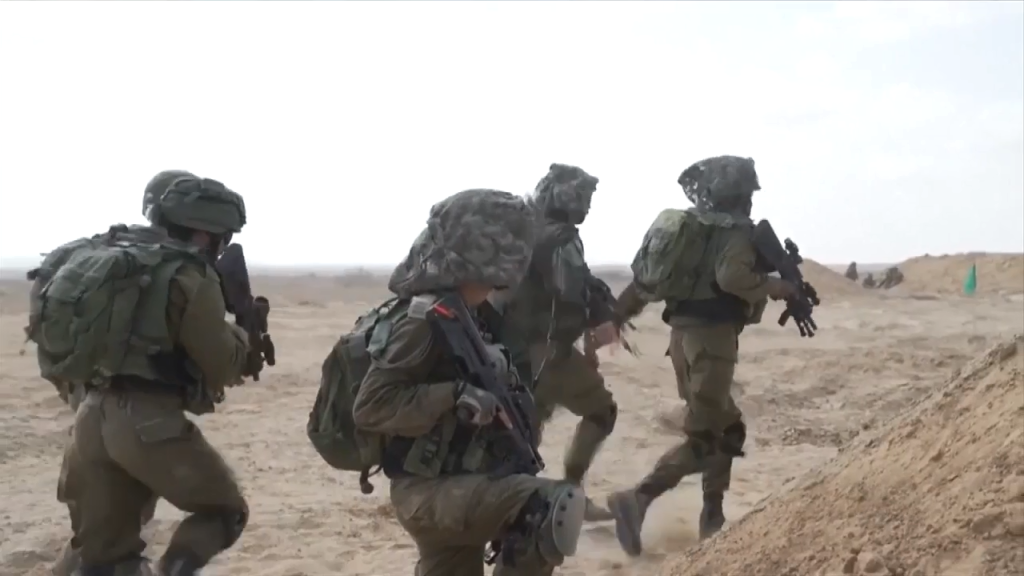Jenin Refugee Camp (West Bank): Israeli forces appeared to have withdrawn from three refugee camps in the occupied West Bank by Friday morning, after a more than weeklong military operation that left dozens dead and a trail of destruction.
Overnight, Israeli armoured personnel carriers were seen leaving the Jenin refugee camp from a checkpoint set up on one of the main roads, and an Associated Press reporter inside the camp saw no evidence of any remaining troops inside as dawn broke early Friday morning.
During the operation, Israeli military officials said they were targeting militants in Jenin, Tulkarem and the Al-Faraa refugee camps in an attempt to curb recent attacks against Israeli civilians they say have become more sophisticated and deadly.
Troops were pulled out of the Tulkarem camp by Friday morning and had left Al-Faraa earlier, but in a statement the Israeli military suggested the operation was not yet over.
“Israeli security forces are continuing to act in order to achieve the objectives of the counterterrorism operation,” the military said in a statement.
Hundreds of Israeli troops have been involved for more than a week in what has been their deadliest operation in the occupied West Bank since the Israel-Hamas war began, employing what the United Nations called “lethal war-like tactics”.
The main focus has been the Jenin refugee camp, a stronghold of Palestinian militancy that has grown since the Hamas attack on Israel that started the war in Gaza nearly 11 months ago.
Fighting in Jenin accounts for 21 of 39 Palestinians who local health officials say have been killed during the Israeli push in the West Bank — most of whom, the military says, have been militants.
The fighting has had a devastating effect on Palestinian civilians living in Jenin.
Water and electric services have been cut, families have been confined to their homes and ambulances evacuating the wounded have been slowed on their way to nearby hospitals, as Israeli soldiers search for militants.
During the operation, Israeli forces sent military bulldozers into the camp, ripping up roads in search of buried explosives.
When asked by an AP reporter about the infrastructure damage caused to the Jenin camp, an Israeli military official acknowledged the destruction but said it was a result of a militant strategy planting explosives in civilian areas. The official spoke on condition of anonymity in line with military regulations.
In the quiet morning Friday, Jenin residents took advantage of the lull to rummage through the rubble of destroyed buildings and take stock of the damage.
Twisted rebar protruded from the concrete of collapsed buildings, and walls still standing were pockmarked by bullets and shrapnel.
In the Tulkarem camp, resident Ziad Abu Tahoun looked with dismay at the torn up streets and crumbled buildings all around him.
“Look at the condition of the camp, the camp is in a deplorable state,” he said. “They’ve set us back 60 years.”
In southern Gaza, health workers resumed vaccinating children against polio, continuing the second phase of a large-scale immunisation campaign.
Children lined up early in the morning outside a United Nations health centre in Khan Younis to receive the vaccine, which was being administered by local health care crews in coordination with UNICEF and the World Health Organisation.
The first phase started Sunday in hospitals and medical locations in the central Gaza Strip. The final phase was to focus on the north, finishing September 9.
The operation was undertaken as an urgent measure to prevent a large-scale polio outbreak after health officials confirmed the first reported polio case in 25 years, in a 10-month-old boy who is now paralysed in the leg.
The WHO reached an agreement with Israel for limited pauses in the fighting to allow for the vaccination campaign to take place. In all, the WHO hopes to be able to vaccinate 640,000 Palestinian children in Gaza against polio.
The war in Gaza began when Hamas and other militants staged a surprise attack on Israel on October 7, killing around 1,200 people, primarily civilians. Hamas is believed to still be holding more than 100 hostages. Israeli authorities estimate about a third are dead.
Israel’s retaliatory offensive has killed more than 40,000 Palestinians, according to the Health Ministry in Hamas-controlled Gaza, which doesn’t distinguish between civilians and combatants in its count. The ministry reports that more than 94,000 more have been wounded since the start of the war.
Israel has been under increasing pressure from the United States and other allies to reach a cease-fire deal in Gaza, but Prime Minister Benjamin Netanyahu insists on a demand that has emerged as a major sticking point in talks — continued Israeli control of the Philadelphi corridor, a narrow band along Gaza’s border with Egypt where Israel contends Hamas smuggles weapons into Gaza. Egypt and Hamas deny it.
Hamas has accused Israel of dragging out months of negotiations by issuing new demands, including for lasting Israeli control over both Philadelphi corridor and a second corridor running across Gaza.
Hamas has offered to release all hostages in return for an end to the war, the complete withdrawal of Israeli forces and the release of a large number of Palestinian prisoners, including high-profile militants — broadly the terms called for under an outline for a deal put forward by US President Joe Biden in July.
Box
American woman fatally shot in the West Bank, doctors say
Nablus (West Bank), Sep 6 (AP) An American woman was shot and killed in the West Bank on Friday, two doctors told The Associated Press.
Dr. Ward Basalat said that the 26-year-old woman was shot in the head and died after arriving at a hospital.
Witnesses and Palestinian media reported that the woman was shot by Israeli troops while attending a pro-Palestinian demonstration against settlement expansion in the northern West Bank.
The Israeli military didn’t immediately comment on the shooting.
Dr. Fouad Naffa, the head of the hospital, also confirmed the death of an American citizen.
The woman was believed to have been shot while attending the protest against settlement expansion in the Palestinian town of Beita, north of Ramallah in the Israeli-occupied West Bank.
The protests happen regularly and have grown violent in the past. A month ago, American citizen Amado Sison was shot in the leg by Israeli forces, he said, as he tried to flee tear gas and live fire.
Basalat, an emergency room doctor at the hospital, said he treated her for a gunshot wound to the head and that she died shortly after arrival.






